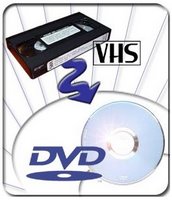 Way back in 1988, I began video taping Boy Scout courts of honor and troop activities to create programs to air on our local community access television station, Mel-TV, and thus promote Scouting in the community. These shows were recorded with a large hand-held camcorder that used VHS tapes, which should have a 10-20 lifespan. A few years ago I switched to using a digital camcorder with mini-dv tapes. I now edit on a computer and print the programs to dvd-r’s, which should have a 40 year or more lifespan.
Way back in 1988, I began video taping Boy Scout courts of honor and troop activities to create programs to air on our local community access television station, Mel-TV, and thus promote Scouting in the community. These shows were recorded with a large hand-held camcorder that used VHS tapes, which should have a 10-20 lifespan. A few years ago I switched to using a digital camcorder with mini-dv tapes. I now edit on a computer and print the programs to dvd-r’s, which should have a 40 year or more lifespan.
Back to those vhs tapes. I have a goal to transfer many of those old tapes sitting at the studio to dvd’s. I have already “saved” a couple dozen programs. Alas, I am too late to save some of them. A couple of the early slideshows were so bad in video quality I could only save the sound, and had to re-edit nearly the whole video which gave me the opportunity to add more pictures to the program. A few tapes have deteriorated so badly that the sound and video are beyond using. Unfortunately, this includes an Eagle court of honor and at least one troop Laughs For Lunch Show.
Are dvd-r’s the answer to archiving the programs? It depends on who you talk to. I have been using dvd’s rated to have a lifespan of at least 40 years. But a lot depends on the manufacturing process. Some of the cheap dvd’s may only last for several years before they begin to deteriorate.
Then comes the next problem. I can place the shows on a dvd, but will dvd technology still be reverent in another ten or twenty years? The world of electronics is constantly changing. For example, look at the world of music that has gone from LP albums, to 8-tracks, to cassette tapes, to compact disc, to the current digital formats.
I currently save a video program as a Quicktime file on my computer and back it up to an external hard drive. This is in addition to making several copies of the playable dvd-r to hand out to family or troop members. As the formats change in the future I hope to update these files. Well, at least for the next 30 years or so. After that, it will be someone else’s responsibility if they want these programs’ lives to be extended.

